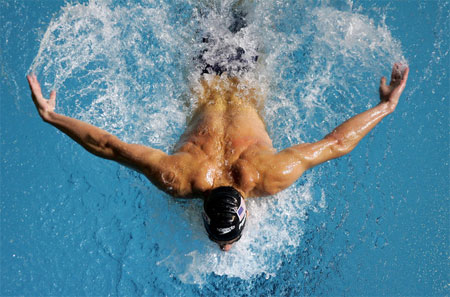 The psychologist and philosopher William James famously wrote: “99% of our activity is purely automatic; all of our life is nothing but a mass of habits.” After reading the book The Power of Habit by Charles Duhigg (which I first wrote about here), it is clear that habits define virtually every aspect of our lives, from how much we eat, save, or spend to how we work, communicate, and interact with others.
One interesting example in Duhigg’s book focuses on Olympic swimmer Michael Phelps. As a child, Phelps was high strung and intense, so his mother got him involved in swimming as a way to manage his tension and anxiety. That’s when Phelps met his coach, Bob Bowman, whose main goal was to help Phelps’ stay calm and relaxed. Bowman also wanted his student to develop automatic willpower so Phelps could become competitive and the strongest mental swimmer in the pool.
The psychologist and philosopher William James famously wrote: “99% of our activity is purely automatic; all of our life is nothing but a mass of habits.” After reading the book The Power of Habit by Charles Duhigg (which I first wrote about here), it is clear that habits define virtually every aspect of our lives, from how much we eat, save, or spend to how we work, communicate, and interact with others.
One interesting example in Duhigg’s book focuses on Olympic swimmer Michael Phelps. As a child, Phelps was high strung and intense, so his mother got him involved in swimming as a way to manage his tension and anxiety. That’s when Phelps met his coach, Bob Bowman, whose main goal was to help Phelps’ stay calm and relaxed. Bowman also wanted his student to develop automatic willpower so Phelps could become competitive and the strongest mental swimmer in the pool.
One of the tools Bowman used was something he called “watching the video tape.” There was no physical video; he was referring instead to the practice of visualization. Every morning and night, Phelps was to relax his body and visualize his practice in the pool. He was instructed to imagine every aspect of his routine in his head and to see every detail clearly.
During the 2008 Olympics, Phelps continued this habit of visualization, just as he had every day since he was 10. It’s a good thing he did. During the 200 meter butterfly, his strongest event, his goggles filled with water. He couldn’t see anything. But he went on automatic mode and visualized the race even though he was unable to see the wall, the other swimmers, or the swim lanes. And he won another gold medal and set a world record. When he was asked afterwards how he was able to win the race under those conditions, he said it was because of his power of visualization. He didn’t need to physically see anything; he could see it all in his mind.
Public speakers can learn a lot from this powerful example.
To be truly great at presenting, you have to develop automatic willpower to prepare for every eventuality. You have to prepare your content and then take the time to practice and rehearse your delivery even when you think you don’t have the time to practice or don’t want to practice. Like Phelps, you must create practice routines (or habits) that lead to success.
I recommend all types of practice routines, including:
- Visualizing yourself giving the perfect presentation.
- Practicing sections of your speech to yourself when you’re doing the dishes, walking the dog, etc.
- Doing formal practice sessions in front of others. During these practice sessions, ask people to comment on specific things you want to improve, such as vocal skills, gestures, eye contact, etc.
- Utilizing small, everyday interactions to practice key skills. For example, during water cooler chat, practice your gestures. At dinner, practice your storytelling skills.
When you practice in a variety of venues and ways, the key skills you want to improve will become more natural and a part of who you are. Ultimately, you have to build your habits, or your habits will build you. Which habits are you trying to eliminate or improve? Let me know in the comments section below.